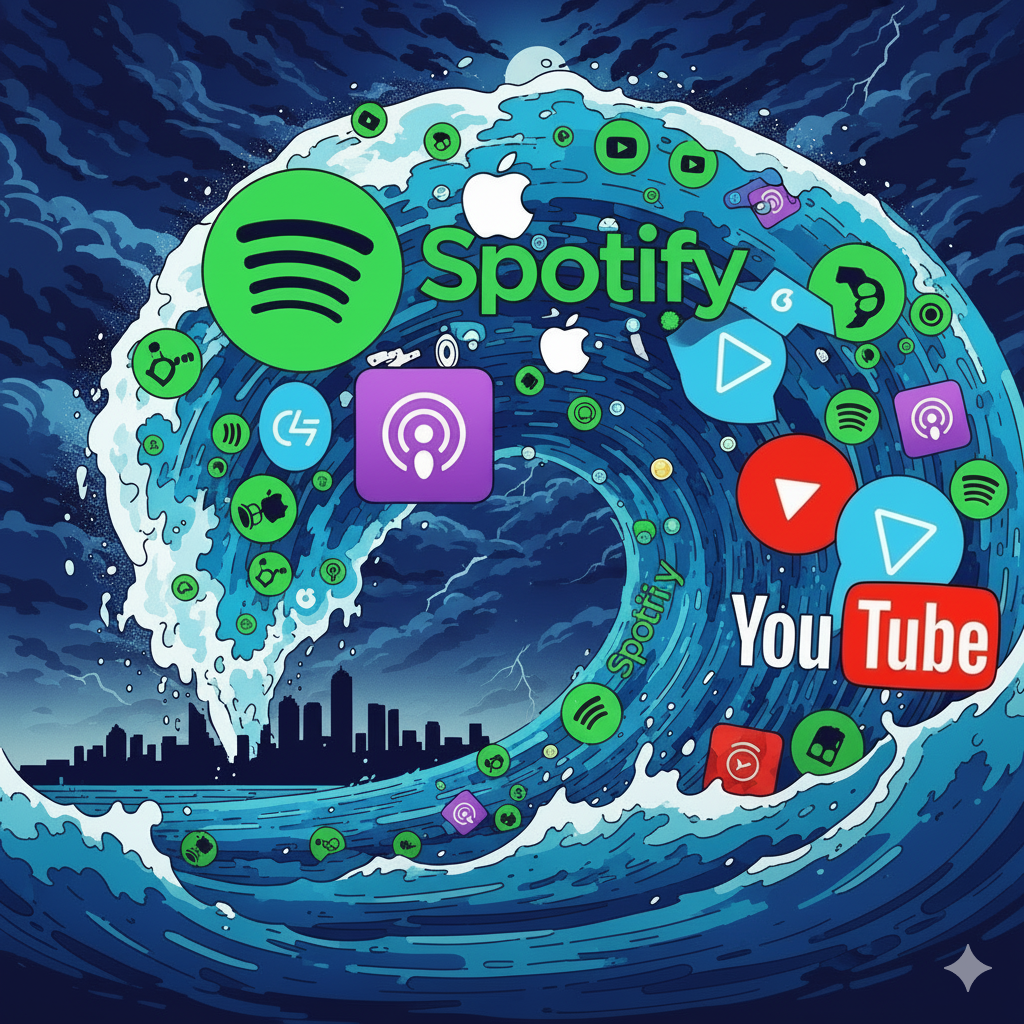The Tsunami of AI Content: When More Becomes Too Much
Last week, a startup called Inception Point AI announced it would launch (or maybe flood?) the podcast world with 3,000 new AI-generated episodes a week, at a cost of about $1 per show. The network is led by Jeanine Wright, who was Wondery’s well-regarded COO. I know Jeanine and have had her join my ongoing “View From the Top” panel series at Podcast Movement. Jeanine was the first major podcast executive to announce they were all in on video podcasts. Clearly forward-thinking.
AI podcasts are indeed often slop. I wrote about this after returning from CES in January. Worth noting, plenty of non-AI podcasts are also slop, but just old-fashioned slop. Jeanine’s announcement also called out critics, telling The Hollywood Reporter, “I think that people who are still referring to all AI-generated content as AI slop are probably lazy luddites. Because there’s a lot of really good stuff out there.”
Calling people “lazy luddites” may not be the best way to launch a product.
I’ve listened to a handful of the shows. The ones I heard announce they are AI. The voices are friendly, and the tone is surprisingly listenable. However the food ‘host” Claire Delish tells us “she” is AI and thus has never eaten any of the food talked about. Most of the content I sampled was less than compelling, however and somewhat begrudgingly, it’s a reminder that AI content is getting better by the week.
I showed the Hollywood Reporter article to my Gen-Z “Business of Podcasting” students. Maybe they are “lazy luddites” but their initial reaction to fake audio was not good. They complain there is already too much to listen to. Granted they have not yet listened. I will report back.
Here’s the rub. Even if it’s improving, AI is fighting against what audiences crave most: authenticity, human reaction and often humor.
In a world hungry for the genuine, the flood of AI content is synthetic.
Quality > Quantity
Yes, much of what’s being churned out will be slop—uninspired, formulaic, and disposable. The deeper issue isn’t just quality, it’s quantity. When anyone can make anything, the instinct becomes to make everything. And that’s the moment we are in. The tools are in place to produce more content, and many creators have opened up the spigot.
The flood of content grows to a tsunami, and when people inevitably get overwhelmed, curation will become more valuable than creation.
The Crest Toothpaste Problem
Think about walking into CVS to buy toothpaste. Entire aisles are filled with Crest options like Crest Whitening, Crest with Charcoal, Crest Pro-Health, and Crest Gum Restore. The abundance doesn’t make it easier to choose. It causes analysis paralysis. You grab the familiar or walk away frustrated.
That’s where all of this appears to be heading. The shelves of content, especially podcasts, are already overflowing. The average listener plays about eight podcast episodes a week. Getting onto that shelf is already tough. Add the flood of AI-generated shows, and the odds of discovery plummet.
Will Audiences Push Back?
It’s not just about standing out against competitors; it’s also about not exhausting your own followers. When every scroll, search, or app feed is filled with indistinguishable variations of artificial voices and recycled formats, audiences may stop trying to listen or watch. Too much of your voice, your content, your updates, can cause people to tune out.
Here’s a critical point for creators and brands: will people reject not only “bad” content but also simply “too much” content? Digital fatigue is real. Just as fans of Marvel grew weary of too many releases, podcast audiences may push back against oversupply.
Where the Real Value Lies
The lesson is clear:
· Some AI content will be good enough. That’s scary but true.
· Abundance will overwhelm. Flooding the zone with podcasts risks driving people away, not pulling them in.
· Authenticity is the differentiator. People still want laughter, surprise, mistakes, emotion—the things AI can’t replicate.
The winners in this next wave of podcasting won’t be those who can make the most content. The brands and creators who succeed will know what not to make and deliver something scarce: the human spark that cuts through the noise.
The reality is the audience backlash won’t be about whether content is human or AI. It will be about whether your content feels necessary, fresh, and worth their limited time. That means creating high-quality content that is unambiguously human.
What do you think?
If The Thought Letter was forwarded to you, sign up here, it’s free.
At Amplifi Media, we’ve spent the last decade guiding forward-thinking companies through the fast-changing world of audio and video. The landscape keeps shifting, but our expertise lies in turning complexity into real-world solutions—helping innovators build smarter, scale faster, and redefine what’s possible. If you’re ready to explore what’s next, let’s start the conversation.

